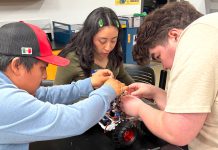GONZALES — Gonzales City Manager Rene Mendez recently spoke as a panelist at California Wellness Foundation’s “What Makes a Good Small Town” virtual seminar.
Coachella Councilmember Megan Jacinto and former West Sacramento Mayor Christopher Cabaldon joined Mendez on the June 17 panel, which was moderated by journalist Diana Marcum.
Mendez explained one advantage for Gonzales is that being a small town grants the ability to be nimble and respond to problems as they arise.
“You don’t have to go through a lot of hoops to get something done,” Mendez said.
He added that cultivating partnerships helps in responding to problems. One such example was the response by the Gonzales Youth Council, as mental health became a growing issue during the Covid-19 pandemic.
“Our young people really galvanized around what can we do, how can we reach out, how can we support,” Mendez said. “We did the surveys, reached out and did a lot of programs.”
Mendez was soon questioned about the Youth Council, and explained the members range in ages from 14 to 17 and are given autonomy.
“They participate within the structure of city government,” he said. “They have the ability to bring forward recommendations.”
By providing their perspectives, the city council is then able to determine if action should be taken in response to those recommendations.
Mendez noted all partnerships are key in small towns, but they must be tended to, much like keeping a plant alive. However, doing so is an advantage of small towns in seeing how to provide key resources and what issues residents are experiencing.
Some resources Mendez brought up were water, housing, jobs and broadband.
“The pandemic really brought a lot of these issues to the forefront,” Mendez said.
Cabaldon mentioned Gonzales’ provision of providing broadband access to all the town’s residents.
“What Rene’s done on broadband is a big national story,” Cabaldon said. “In Gonzales, it’s not a big city, and so in a smaller town you can imagine actually solving a problem. Gonzales was too small to know that it was impossible.”
“One of the things that’s needed for a small town is creating this sense of opportunity and possibility,” Mendez added. “Just because we’re a small town doesn’t mean we don’t have that.”
He said it’s not only a matter of resources, but also the other components of a town, such as schools, parks and housing.
“There’s incredible need for small communities to have adequate housing,” Mendez said. “It’s a challenge to get there and it’s been a challenge for the last couple of decades. We’re trying to work on it.”
One of the unique aspects of small towns and their closer connection to residents means faster feedback.
“We don’t have an opportunity to complain because we’ll get it thrown right in our face immediately, so we’ve got to figure it out,” Mendez said. “That doesn’t mean we’re successful all the time.”
In regard to providing jobs, Mendez said it’s a matter of evaluating what a city can do well or what it can do in coordination with surrounding areas. In the case of Gonzales, the town has strengths in ag and agtech.
In addition, a town has to understand its connection to larger issues.
“We have a pretty good sustainability initiative here, but how does that put food on the table?” Mendez asked. “How does that improve life? Nobody wants to destroy the world, but what does that mean when you’re a farmworker and you’re never home and your kids are by themselves?”
Mendez explained small towns are able to make the connection more readily apparent.
“We don’t need a study to tell us people want housing, people want education, people want water, people want opportunity,” Mendez said.














